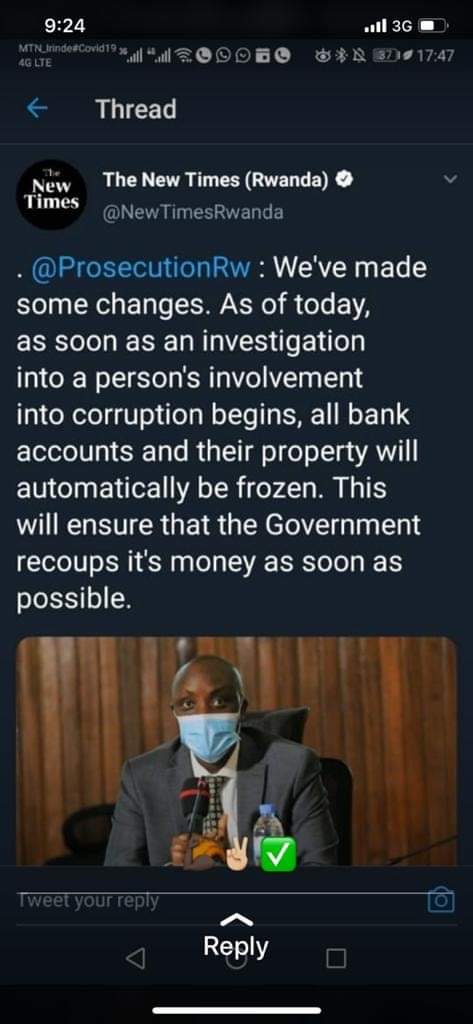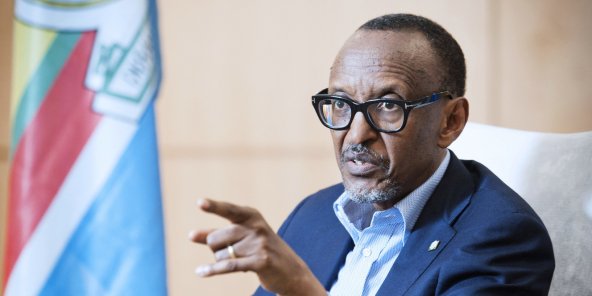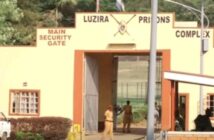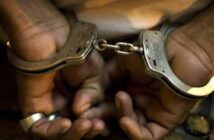Rwanda is not looking back in its fight against corruption. It has taken austerity measures to clamp down on corrupt government officials.
Suspected corrupt public officials risk facing hefty fines and auctioning of their property if convicted as the country grapples with dwindling domestic revenue impacted by the Wuhanvirus outbreak.
In an exclusive virtual interview with The EastAfrican on Thursday, July 30, President Paul Kagame reiterated that his government will continue to mount pressure on high profile officials suspected of corruption. The statement was made pursuant to the recent arrests of public officials suspected of corruption.
“To minimise or reduce corruption like in our case (Rwanda)… simply means maximising pressure on the corrupt. What is happening now is exactly in that direction,” President Kagame said.
“We have always talked about not entertaining corruption as our way of life. That has always been at the centre of the politics that I have associated with and others in this country, and I think there is respect for that,” he said, underlining Rwanda’s abhorrence for corruption.
“For me, the most important thing to do is to do things properly. Follow due process and fairness, listen to the person who is accused to ensure they are aware that the case is real, therefore, accountability is necessary,” he added.
Rwandan prosecutors announced that it is considering seeking the freezing of bank accounts and properties of officials under investigation, as it emerged that some have devised crooked means to conceal their assets once under the radar of investigators.
“We have made changes. As soon as a person is investigated for corruption, all their bank accounts and property will automatically be frozen. Any individual who claims to own property of individuals suspected of corruption will also be prosecuted,” Prosecutor General Aimable Havugiyaremye said at a press conference on Tuesday.

But lawyers have raised concerns saying the presumption of innocence for suspects is at stake and called for more dialogue with the prosecutor before the implementation of the new procedures.
“Our concern is that if you freeze the bank accounts and assets at the beginning of an investigation, then the presumption of innocence can be at risk,” President of the Bar Association, the lawyers’ lobby, Julien- Gustave Kavaruganda, told The EastAfrican.
“The family and dependants of that person may also experience severe financial constraints. If the suspect is an employer, paying staff at home or at the office may also be at risk. The main clarification we need now is not about the law – because the law is quite clear – but on the way forward.”
Mr Kavaruganda suggested that “there is another way of controlling assets of those suspected of corruption instead of automatically freezing their assets. Their passport can be confiscated; their bank can be ordered to report the suspicious movement of large amounts of money on their accounts.”
“But for normal bank transfers, such as payments to the revenue authority, salaries and VAT, people should not be penalised just because they are still under investigation. Two months without being able to access your bank account can be problematic.”
President Kagame too does not back the prosecutor’s latest move.
“I do not see why the seizure of property should be carried out in advance, even before the case is understood or getting to the bottom of the facts. That would be wrong in my opinion,” Mr Kagame said in the interview.
“I also for one insist that this must involve justice, fairness and due process of law so that you don’t end up victimising somebody wrongfully and you find that you have named the corrupt person wrongly, maybe they are not the ones, things like that. Even the seizure of properties; if it has to happen, it has to happen in an orderly lawful fashion. It has to follow the process of law; it has to follow the fairness and justice.”
Last month, all public officials were ordered to declare their assets as the government seeks to unearth top officers whose wealth cannot be explained
Last year, up to 1,187 suspects were tried for corruption and mismanagement of government funds with most of them being junior officials.



